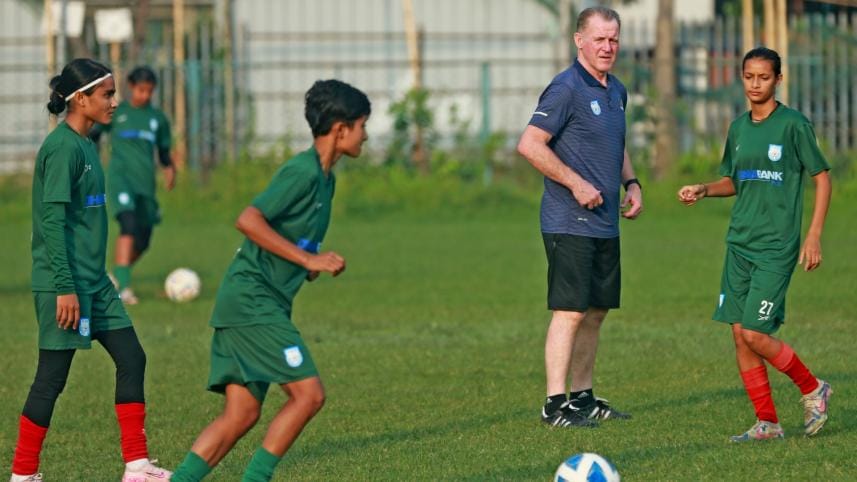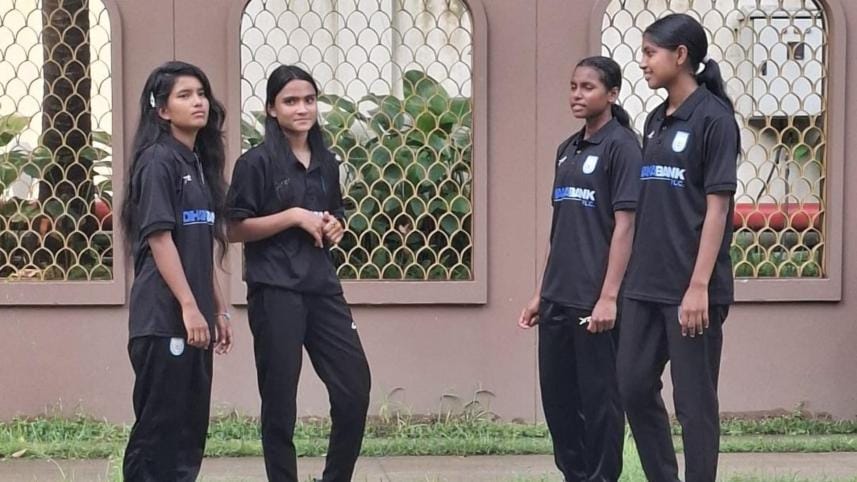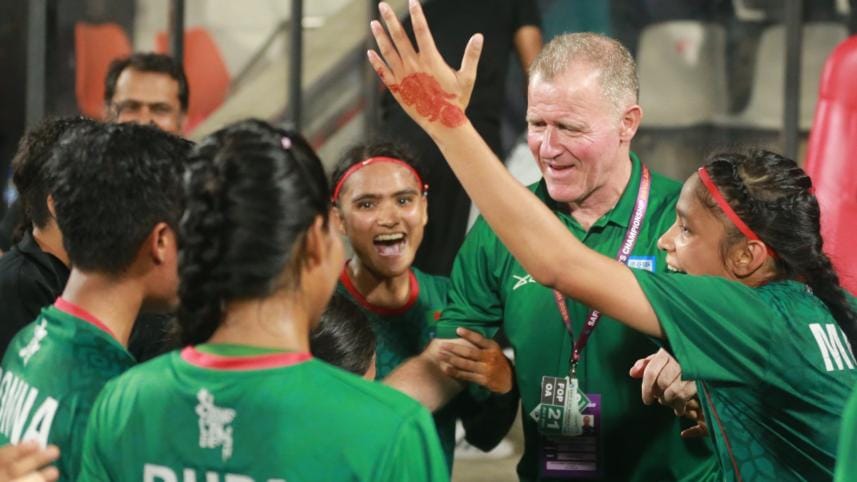‘Modern football demands athletes’

Outspoken, stubborn, successful. That is probably the best way to describe Peter Butler, the coach of Bangladesh national women's football team. He may have ruffled a few feathers in several quarters since taking charge of the team in March 2024, but the Englishman has delivered success, and more importantly, he has shown the pathway to the football federation how to keep growing and achieving bigger targets. In a freewheeling interview with The Daily Star's Atique Anam at the team hotel in Dhaka, the former West Ham United midfielder opened up about his football methodology, plans for the future, the shortcomings of the federation, men's football, and the controversies he has found himself in. Following is the first part of the two-part interview:
The Daily Star (DS): SAFF Championship 2024, Asian Cup Qualifiers, and SAFF U-20 Championship -- three tournaments, three trophies. Can we expect two more in the next two months?
Peter Butler (PB): I would say that more than the trophies, the most important thing I've tried to instil is a competitive environment. The team needed a shake-up. For too long, it had been a copy-paste selection approach, with players almost picking themselves. That's not a knock on them – it's just that things had become stagnant. I wanted to bring in new faces and make players fight for their places again. It's about getting them out of their comfort zone.
DS: But the team did win the SAFF Championship in 2022, and won by playing good football.
PB: They did, but if you look at what happened after that, it was a disaster. The team suffered heavy defeats and lacked a clear plan. For nearly a year, things were going nowhere. When I did my research before taking this job, I noticed massive cracks in the system. Some players had reached the end of their cycle. That doesn't mean they had no value, but there's a difference between being a focal player and being an impact player. My philosophy is simple: create competition, play high-tempo, high-intensity football. But that demands fitness. And many of the players were struggling with that.
DS: You've emphasised on fitness and food since the very beginning. What exactly did you do in those areas?
PB: I never imposed a strict diet. What I did was introduce responsibility – weight management and portion control. For instance, instead of having rice three times a day, maybe cut it down to once or smaller portions twice. It was about being aware. I gave advice, not rules. If you're ordering takeaway pizza at 10pm, that's not the behaviour of a professional athlete. I paid attention to these things because they influenced selection. If someone can't last 90 minutes, that becomes a factor–especially at the international level, where you're facing teams ranked in the top 50. Modern football demands athletes. If you're not one, you can't compete.
DS: Paul Smalley reportedly introduced proper diet charts for the players before you came.
PB: Well I don't know. I don't want to comment on Smalley, but Smalley basically got a lot of things wrong. I'm sure he did many things right, but when it comes down to diet, when it comes down to the food they were eating, it was atrocious. Not nutritious at all. It's improved a bit now, thanks to the president.
If you ask me, fish is great – high in protein. Bread and roti in large quantities? Not so much. Steamed rice in moderation? Better. Lean meats, less fat, less fried food. That's the core message. It's about making small, sensible changes. You can still eat the local diet – just do it with awareness.
DS: What about the living conditions?
PB: The living conditions are still atrocious. I've never seen a football team kept in such poor facilities. It's not humane.
DS: But when the media write exactly what you're saying, they are vilified by the BFF.
PB: That's the truth, though. And thankfully, the president agrees with me. Things are slowly improving. For example, the president has approved hotel stays for camps so the girls don't have to go back to the BFF dorms. But some people still want to keep the old system because it suits them. That's wrong. I'll keep pushing for change – not just for the women's team, but also for places like Kamalapur Elite Academy – the boys' academy – which is also in bad shape.

DS: With 'Mission Australia' in focus, You've submitted a plan to the president, Tabith Awal. What are the key aspects of that proposal?
PB: The most important thing is to continue actively with the under-20 programmes. Over 50% of our group are under-20s, and that won't change. I won't tinker with it. My rotation was geared toward AFC qualification.
SAFF was always going to be a rotational project. AFC (Asian Cup) is a great opportunity for the girls to get three competitive games under their belt. Keep in mind, there's no FIFA window in February -- only in March. But I told the president I'll never turn down a game, even outside the window.
DS: Have you submitted any requests for specific support staff -- physiotherapists, coaches, etc?
PB: I'm quite loyal -- maybe too loyal. I back people who back me. The program is geared toward the 29th of July – when the draw happens. Then we'll know where we'll be.
I've done my research. I know Australia well – I lived there for two years…. So it's about developing camps – maybe in the Middle East – where we can get games. We need to play teams like UAE or Myanmar – ranked 55. I think we're better than Myanmar. Can we reach 55? Yes, but it's about managing squad selection, camps, and FIFA windows.
DS: You're having to work with three teams simultaneously: seniors, U-20s and U-17s. With the groups overlapping, does it make your work a bit easier, in as much as having a better idea about the pool of players?
PB: No, it's really difficult. It's draining. That's why I look knackered – lack of sleep. It's really challenging. But I knew I could make it work. The ultimate prize was qualification for the AFC, so I used the Under-20s wisely.
In fact, some of the girls going to Bhutan actually helped me because it opened up opportunities for other players like Oyeshi Khatun, Ayonto Bala, Trishna Rani, who haven't been utilised much. I strongly believe we've got the nucleus of a really outstanding group of young players coming through. Shanti Mardi will only get better, and Umehla Marma too. But we've got to keep getting them on the training ground – drill them, organise them.
I don't believe in philosophies. I believe in methodology. I believe in good, solid principles. What I believe in are fundamentals, principles, and creating a clear playing identity – a DNA.
Bangladesh football never had a DNA before I came. The DNA was: smash it down the pitch, fight for second balls, and the ball comes straight back. My DNA has always been: we look to play, we press, we play with intensity, we get the ball down, and we pass with a clear identity. I'm trying to build that for the federation.

DS: You recently said that Ritu Porna deserves to be playing in a better league, like the UAE.
PB: She should be. And Monika as well. But Monika has to be careful about her fitness. My biggest concern with the players going to Bhutan is the fitness levels, the training intensity, and the lifestyle. They don't play enough games.
I strongly believe we have a group of players who, in my personal opinion, can go on and play in stronger leagues. But the problem is breaking the myth. Immediately, when people hear "Bangladesh," the reaction is: "No league." That works against them. And then there's the FIFA ranking-- we've got to improve that to gain credibility.
DS: Have you spoken to the president or the women's wing chairman about the women's league?
PB: Yes, I have. My view is plain and simple. I've put it forward: a six-team league. under-23s only, with three overage players allowed. If you're over 30, you can't play. That's my honest opinion.
You've got to develop a league that gives young players game time. You can't have teams loaded with senior national team players like before -- like when Nasrin Academy and others were stacked with them. That doesn't work.
DS: Any restriction on how many national players can be in one team?
PB: I believe in a quota system. You shouldn't be allowed to have more than five national players on the field at one time. And if you're playing an under-20 on the bench, you must replace them with another under-20. I've put those ideas forward to Fahad Karim and (Mahfuza Akter) Kiron. Now it's up to them to consider implementation.



 For all latest news, follow The Daily Star's Google News channel.
For all latest news, follow The Daily Star's Google News channel.
Comments